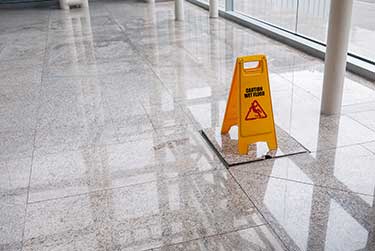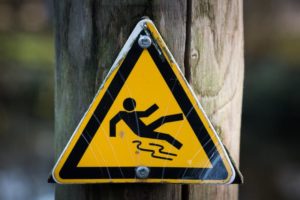 Slip and fall accidents take our clients by surprise. One moment they are entering their favorite store and the next they are lying flat on their back with a broken neck.
Slip and fall accidents take our clients by surprise. One moment they are entering their favorite store and the next they are lying flat on their back with a broken neck.
Whether you have fallen in a store, on private property, at work, or in a public place, you might be entitled to compensation. Read on to learn more about how slip and fall cases are settled.
Determine who is Responsible for the Property
Generally, property owners or occupiers must use ordinary care to keep their property safe. Identifying the party that owed you this duty of care can sometimes be complicated, especially when you are injured in a commercial building.
For example, when injured at a business, the landlord or the tenant might be responsible, depending on where you slipped and fell. If you fell in a common area, the landlord might be responsible.
However, if you were injured inside the business, then the business tenant might be responsible.
If you were injured at a private residence, the property owner is usually the party responsible, unless they rent the property to a tenant.
Injured victims are not required to figure out who is responsible. Instead, they should consult with a Georgia slip and fall lawyer to review the circumstances of their case.
Identify whether the Owner or Occupier was Negligent
Under O.C.G.A. 51-3-1, owners and occupiers owe visitors a duty of ordinary care. Typically, this means they must fix hazards they know about – or should have known if they used ordinary care to inspect their property.
For example, a store owner should clean up any spills in the aisle they know about. They should also periodically inspect their aisles to discover if any liquids or objects are on the floor.
Owners also must make safe any hazards they create or warn visitors of them. As an example, a store owner should put up a sign or a cone, warning customers when they have freshly mopped their floors. A property owner who digs a hole should set up saw horses or otherwise rope off the area so a guest does not fall into the hole.
As you can see, slip and fall cases are fact-specific. There are no bright-line rules indicating when someone has been negligent. Instead, a jury looks at all the facts.
To help prove negligence, however, injured victims should fully document whatever it was they slipped on. For example, use your smartphone to take a picture of any liquids in a grocery store aisle, or ask someone else to take a picture.
Analyze whether the Victim was Negligent
Georgia law recognizes that victims can sometimes contribute to their own injuries through their own carelessness. This is called contributory negligence. A victim’s own negligence will certainly be a focus as both parties work towards a settlement.
Under Georgia law, a victim who could have avoided an accident through ordinary care cannot receive any compensation. In all other cases, a victim can still receive compensation so long as their negligence did not equal or exceed the premises owner’s negligence.
In practice, this means our clients can be 49 percent responsible for their injuries, but not 50 percent or more.
Some pedestrians are injured because they failed to pay close enough attention to where they were going, or they willingly confronted a known risk. Although a pedestrian does not have to look closely at where each foot falls, they are negligent if they were reading a text message or a book while walking.
Negligent victims can expect their slip and fall out of court settlement amounts to be reduced by their percentage of fault. For example, if our client was 33 percent responsible for their injuries, then they should expect to receive 33 percent less than someone who was completely blameless.
Calculate the Victim’s Losses
Slip and fall settlements compensate victims for their economic losses, as well as non-economic losses, which are harder to calculate. For example, our clients have received compensation for:
- Medical care, including past, present, and future doctor’s visits, prescription drugs, surgery, rehabilitation, and assistive devices
- Past, present, and future lost wages when they could not return to work as they recuperated
- Property damage for any property damaged in the fall
- Pain and suffering
The amount of a victim’s slip and fall settlement will depend entirely on the circumstances, including the severity of their injuries and the costs to treat them. Typically, clients can receive full compensation for economic losses like medical care, lost wages, and property damage (unless they contributed to the accident).
Calculating pain and suffering are trickier. Often, insurance companies have a computer program they use. A claims adjuster enters information about the injuries a person has suffered, and the computer spits out an amount.
Of course, the slip and fall attorneys at Blasingame, Burch, Garrard & Ashley do not simply go along and accept the insurance adjuster’s offer. Instead, we rely on our own experience to calculate how much our client’s pain and suffering is worth.
Identify the Assets a Defendant Has Available
A fair slip and fall settlement should fully compensate you for your losses. However, many times a property owner does not have unlimited resources. This is especially true if you are injured on someone’s private property (as opposed to a business).
In these cases, the defendant might rely on a homeowner’s policy to pay out compensation. Your attorney will need to know the maximum amount of the policy because that is probably all you can receive as compensation.
Injured in a Fall? Contact Blasingame, Burch, Garrard & Ashley
After a fall in Georgia, you need an experienced advocate to represent your interests. Property owners and their insurers are not eager to settle lawsuits fairly, so you need an advocate who understands how slip and fall cases work.
If you would like to speak to one of our attorneys, please call or submit an online message. Our initial consultations are free and confidential.


